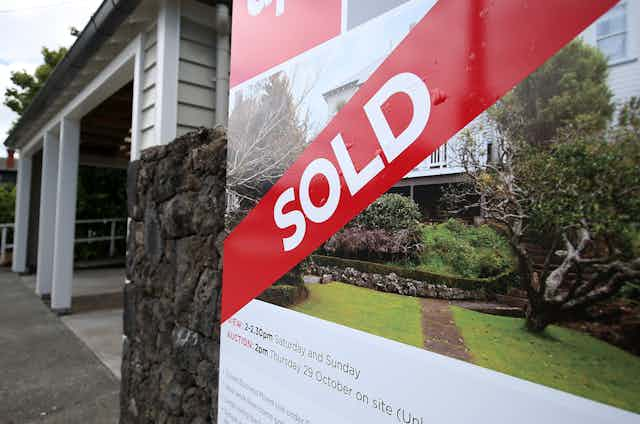The property market is New Zealand’s largest industry, adding NZ$41.2 billion a year to gross domestic product. But there is a debate over how we tax houses – particularly those sitting empty despite the ongoing housing crisis.
Housing affordability is a concern for both renters and home owners. Last year, one in four rental households spent more than 40% of their disposable income on housing costs, compared with one in five households that were paying a mortgage.
A comprehensive capital gains tax has been ruled out by both major political parties.
While the bright-line rule means home owners have to pay income tax on profits from properties sold less than 10 years after purchase, this still only applies to house sales. What about those investment properties sitting empty for investment reasons?
My forthcoming research looks at the feasibility of taxing empty homes and what I found was a potential source of substantial revenue for the government.
Empty homes during a housing shortage
Around 5% of New Zealand’s housing stock – 95,000 dwellings – were considered empty during the 2018 census.
According to the Empty Homes report, roughly 10% of the empty homes surveyed were intentionally being kept empty, while 35% were empty because they were holiday homes. A further 8% were kept empty for personal use (often as a second home), 23% were empty for renovations and repairs and about 17% were vacant rentals, sometimes due to non-compliance with Healthy Homes Standards. The remaining 6% were empty for “other reasons”, which often meant they were awaiting sale.
Read more: Taxing empty homes: a step towards affordable housing, but much more can be done
It was not clear how much of New Zealand’s housing stock remains in the hands of overseas-based investors after rules changed in 2018 to restrict foreign ownership.
But the National Party has promised to allow foreign buyers back into the property market. Under National’s plan, foreign buyers will be limited to properties over $2 million and will need to pay a 15% tax on the sale price.
Introducing an empty homes tax
My research examines the under-utilisation of property taxes by the New Zealand government.
In the financial year 2021-22, the central government earned 4.7% of its total tax revenue from property taxes, below the OECD average of 5.7%.
But New Zealand is fertile ground for an empty house tax, which would directly impact property investors and those who have the means to own multiple properties.
An empty house tax targets home owners who let a property sit empty for a certain length of time.
New Zealand would not be breaking new ground with an empty house tax. This type of tax already exists in a number of countries.
What’s more, New Zealand has the infrastructural prerequisites needed to implement an empty house tax.
New Zealand has an existing land registry which records essential information regarding all parcels of land, bypassing the need to establish this data or to rely on self-reporting form home owners.

A potential boon for government
Some sort of empty house tax could be a source of revenue for the government, as illustrated by cities and countries overseas.
Empty properties in Paris, France, incur an annual surcharge of 160% of the standard property rates. In Vancouver, Canada, vacant homes are taxed at 3% of the property’s taxable value and failure to pay can result in fines.
In Ireland, the empty house tax is three times the property’s existing base local property tax. And in Melbourne and Sydney, house buyers who leave a property unused for six months face an annual charge of at least A$5,500 (NZ$5,978).
Read more: Airbnb and empty houses: who's responsible for managing the impacts on our cities?
These countries’ responses to vacant properties suggest that high rates and tax penalties steer investors toward more productive areas of the economy - a reason cited by policy makers in Vancouver and elsewhere for introducing the tax.
Following the Vancouver model, an empty homes tax on property in Queenstown could generate $255 million a year.
Time for serious consideration
New Zealand could take one of two paths when introducing an empty home tax.
The first option is to charge a tax of between 200% and 300% of rates, similar to Ireland. Alternatively, we could introduce a tax of 3-5% of land value, like Vancouver.
This tax could be tailored to cities and regions, with empty homes in cities like Queenstown and Auckland incurring higher charges than other areas.
The rules could exempt residential and rental properties, with an exception for holiday homes unless they are normally used for Airbnb. People forced to relocate from their residential homes for extended periods due to work requirements could also be exempted from paying the empty home tax.
Read more: Proving the wealthiest New Zealanders pay low tax rates is a good start – now comes the hard part
To ensure the success of the empty house tax, we need to include credible measures to monitor compliance.
The revenue from an empty house tax could then be funnelled into building new homes.
Property investors benefit from New Zealand’s lack of an empty house tax. An empty house is still an asset accruing value, even without rent.
On the flip side, introducing an empty house tax will penalise land holdings for speculation, encourage property owners to enter the rental market – which could in turn increase rental affordability.

